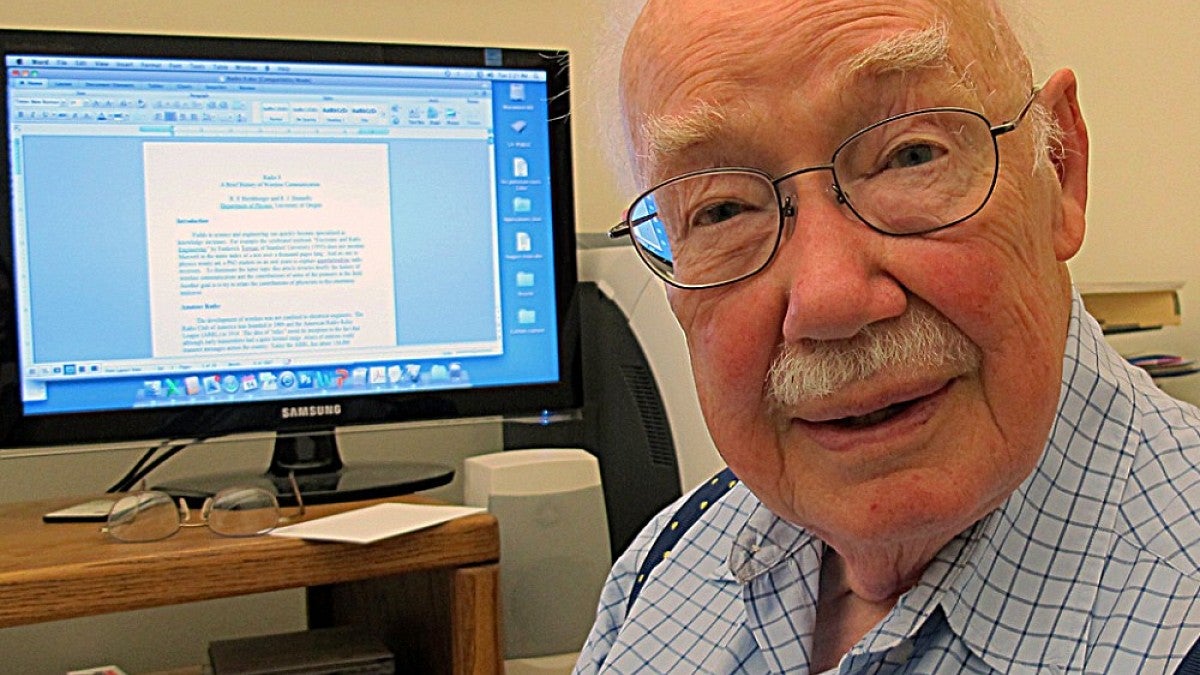For a man who spent so much of his time in the cold, Russ Donnelly was an awfully warm guy.
A physics professor at the UO for almost 50 years, Donnelly was well-known for his research into low-temperature physics and later for studies of turbulence. But he was also a music lover, a stargazer, a history buff and a classical music fan who matched donations to the UO's KWAX public radio station anonymously, using the name of his cat, Vortex.
Donnelly died June 13 at the age of 85. A memorial gathering held Wednesday, July 22, filled the Willamette Hall atrium as family, friends and colleagues remembered his life and career.
"Russ Donnelly was incessantly curious," said Scott Coltrane, senior vice president and provost. "He was profoundly interested in how and why things work, and he made contributions far into his 'retirement' years, although the term 'retired' hardly seemed to fit him. The entire campus will miss his optimistic and infectious curiosity."
Donnelly will be remembered not only for his pioneering work in low-temperature physics and fluid dynamics but also for helping build up the UO’s physics department, helping establish Pine Mountain Observatory and being an early and longtime supporter of the Oregon Bach Festival. And this man of the cold, whose research “playground” was a giant vacuum bottle filled with helium cooled almost to absolute zero, will always occupy a warm spot in the memories of many on campus.
“Everybody hit it off with Russ, because he was just that kind of guy,” said Stephen Gregory, a UO physics professor and Donnelly’s colleague and next-door office neighbor. “Russ never had a negative spin on anything.”
Donnelly was a meticulous man whose office was always tidy, but there wasn’t a day when he wouldn’t rather be in his lab. He spent almost 60 years doing physics research, mostly in his specialty of low-temperature physics but also touching on astrophysics as well as the study of turbulence.
One of his breakthroughs came when his interest in cryogenics inspired him to research methods of mitigating air pollution. In 1978 he developed a technique for capturing sulfur and other elements from paper and coal plants.
With his colleague E.G. Ebbighausen and others, he also helped establish the UO’s Pine Mountain Observatory in 1967. It was and remains the only research observatory in Oregon and has grown to four telescopes from its original one.
The project was an example of Donnelly’s wide-ranging curiosity about the physical world and his hands-on approach to finding ways to analyze it.
“Russ was the epitome of a good scientist — simultaneously interested in many aspects of the way the universe works while also recognizing the need to build precision instruments to better measure these aspects,” said another UO colleague, astrophysics professor Greg Bothun.
One of Donnelly’s prouder achievements was successfully guiding the production of a two-part PBS documentary, “Absolute Zero,” that told the story of low-temperature research. He worked for more than six years to bring the highly acclaimed story to television, serving as the program’s principal science consultant. It originally aired in 2008.
When he wasn’t in the lab, Donnelly often was pedaling his bike around town or catching a performance at Beall Hall. He was an enthusiastic supporter of the Oregon Bach Festival as well as the Oregon Mozart Players and the UO’s classical music radio station, KWAX-FM.
Royce Saltzman, director emeritus of the Oregon Bach Festival, said Donnelly was a longtime supporter of the annual classical music event. His late wife and UO art faculty member, Marian Card Donnelly, wrote a history of the festival for its 25th anniversary.
It was Marian Donnelly who, more than 25 years ago, came up with the idea of making a challenge grant to KWAX in the name of the couple’s cat, Vortex, during the public radio station’s on-air fundraisers. The idea proved wildly popular, and Russ made it a regular feature every year since, right up until this May.
Caitriona Bolster, the station’s music director, said the Donnellys insisted that the challenge be anonymous. Until now, few outside the station have known who was behind the gift challenge.
“It was simply brilliant and served as a huge catalyst during our on-air fundraisers,” Bolster said. “Every fundraiser we had people who would wait for the Vortex Challenge to get underway before they would respond. Russ and Marian were devoted listeners and supporters over the years.”
Around campus, another well-known Donnelly trait was his enthusiasm for bike riding. He said it helped him think, although some playfully wondered if his thinking and riding were a good combination.
“He always said he had great thoughts when he was out riding his bike,” Gregory said, smiling. “Who knows how many people he ran down while he was thinking them.”
But the thoughts kept coming, and Gregory said Donnelly continued an active research program until just before his death, coming in to his office regularly and still winning research grants as recently as April 2014. He was determined to pursue science as long as he was able to do it.
“There’s no way he would have stopped, no way at all,” Gregory said. “He was just incredible.”
—By Greg Bolt, Public Affairs Communications


